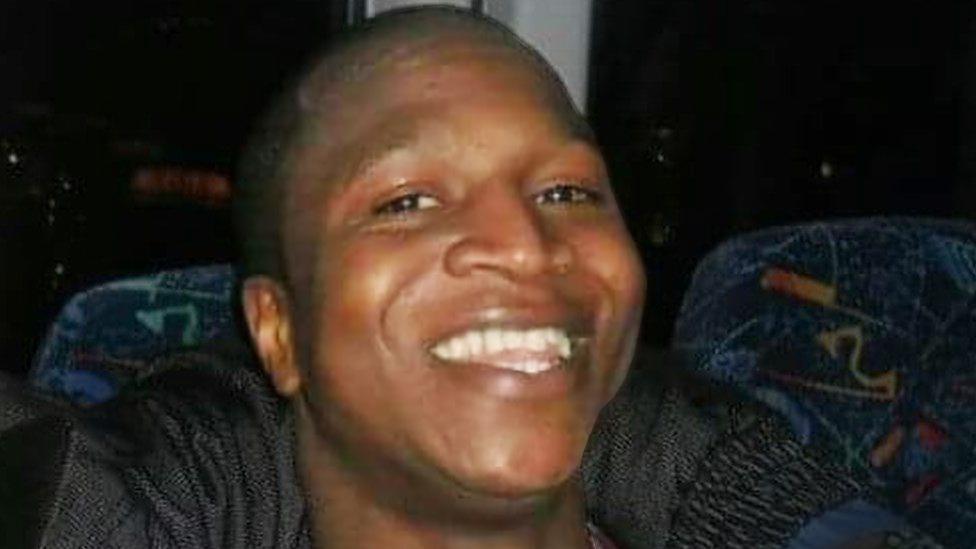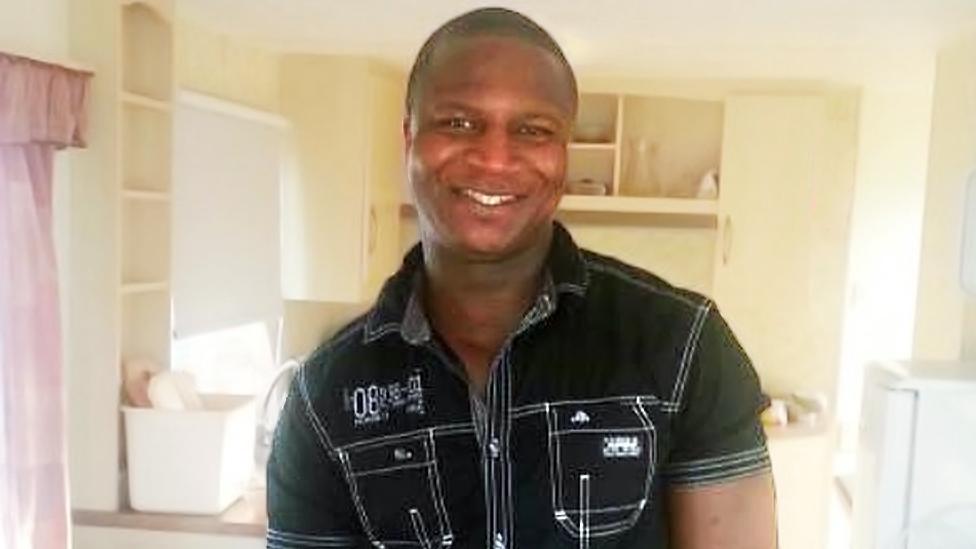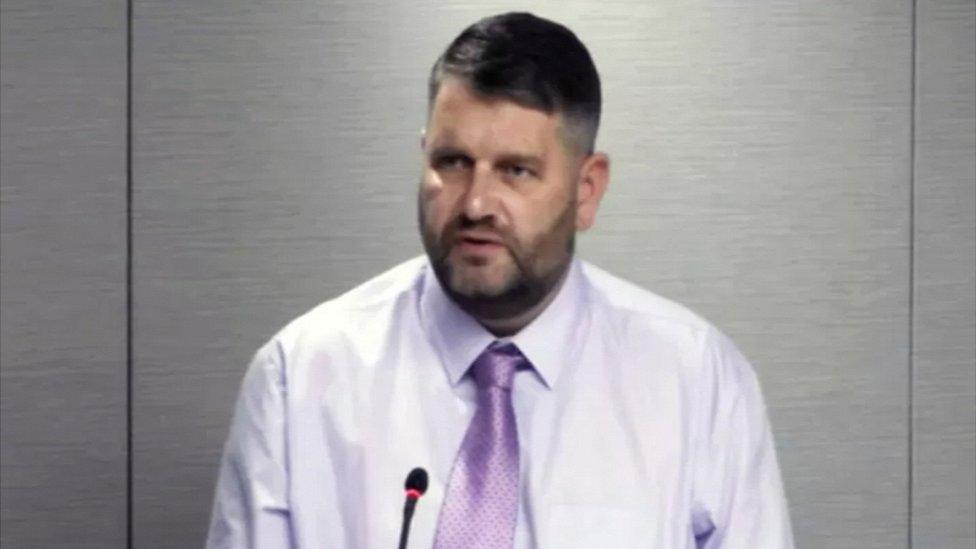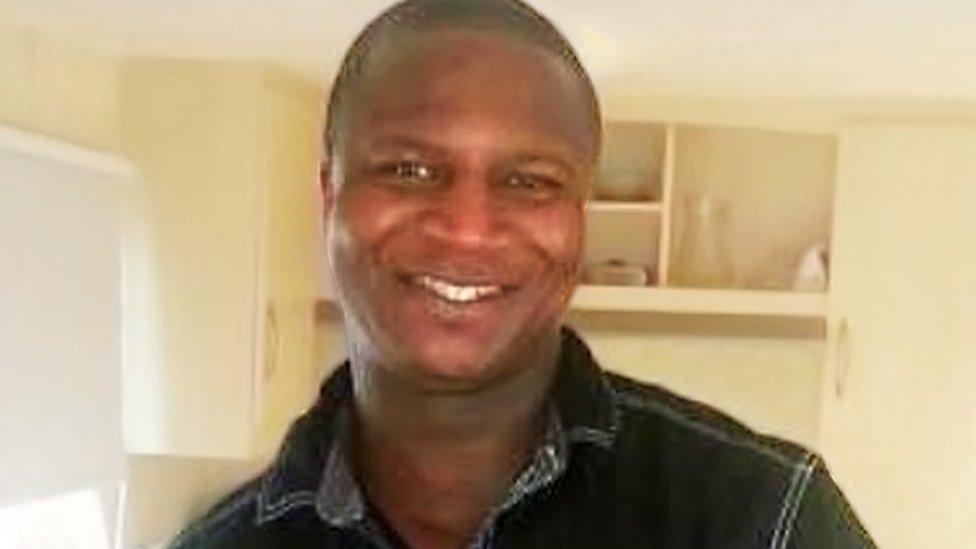Sheku Bayoh family told of post-mortem examination after police
- Published

Sheku Bayoh died after being restrained by officers in Kirkcaldy in May 2015
Police officers involved in the incident which led to Sheku Bayoh's death were given some of the results from his post-mortem before his family were told it had taken place.
The 31-year-old's family had asked to see him before the examination - but it went ahead without their knowledge the day after he died.
Police officers involved in restraining Mr Bayoh were told it had happened.
However, his family did not find out until the next day.
A former police commander has told the public inquiry into Mr Bayoh's death they should have been informed first.
The initial results were that the cause of death was unascertained pending further investigation.
But that evening the officers were told that blunt force trauma had not been involved.
The family found out the post-mortem examination had taken place when they were informed by their solicitor on 5 May.
On the day of the incident, members of the public had reported that Mr Bayoh was carrying a large knife in the street and behaving erratically.
He did not have the knife when the police arrived but a violent confrontation followed.
One of the officers has told the inquiry he struck Mr Bayoh on the head with a baton after Mr Bayoh punched a female officer to the ground.
Mr Bayoh was then restrained on the roadway. He lost consciousness and died in hospital.
The Scottish Police Federation had advised the officers not to give statements about what happened until their status as witnesses or suspects was made clear.
Giving evidence at the inquiry, the former commander of Police Scotland's Fife Division agreed that a death during a restraint could have been caused by criminality or the justified use of force.

Mr Bayoh was training to be a gas engineer, had a partner, and was father to two boys
Retired Ch Supt Garry McEwan said at the time the officers were told about the post-mortem examination, there was no suggestion criminality was involved or they were anything other than witnesses.
"If there's no criminality apparent at that point, for me the welfare of the officers is very important," he said.
"They have been involved in this tragic death the day before and of course they will be worried."
The inquiry counsel Angela Grahame KC asked Mr McEwan: "Do you have concerns about the fact that the officers were told on the Monday night, but the family weren't told until the Tuesday?"
He replied: "Yes, absolutely. Out of respect and dignity for the family, they need to be at the top of your list for informing of the result."
The police officers involved in the incident provided statements in June 2015. The Crown Office later decided no one would face charges over Mr Bayoh's death.
Mr McEwan told the inquiry that within two minutes of hearing that Mr Bayoh had died, he took the step of declaring a critical incident for the first time in his 25-year police career.
Doing so meant the chief constable would be informed and all necessary resources would be made available.
Mr McEwan feared Mr Bayoh's death could cause public disorder similar to the riots that took place in England in 2011, after a black man, Mark Duggan, was shot dead by police.
In the hours that followed, prosecutors appointed the Police Investigations and Review Commissioner (PIRC) to take over the investigation into Mr Bayoh's death.
Mr McEwan told the inquiry that from the moment they arrived in Fife, it was obvious that PIRC did not have enough people to do the job.
"At no time did they have the capacity to do it," he said.
"When an independent investigation team arrive for an incident of this scale and there's five or six members of staff, you can see clearly that they're not going to have the capacity to push this forward."
No mention of police contact
The inquiry has heard that police delivered three "death messages" to Mr Bayoh's loved ones on the day he died.
The first was given to his partner Collette Bell at Kirkcaldy Police Station. Senior officers had decided not to tell her that he had been in contact with the police.
Asked about that decision, Mr McEwan said it had "not been the right thing to do. Why wouldn't we?"
In the middle of the afternoon, detectives met Mr Bayoh's sister Kadi Johnson and her husband Adi Johnson. Again, no mention was made of police contact.
A third message given to the Johnsons said officers had been attempting to arrest Mr Bayoh when he became unconscious.
Mr McEwan said PIRC had taken the "wholly inappropriate" decision not to send family liaison officers to see them until the next day.
He took it upon himself to visit the family to tell them as much as he could, despite PIRC asking him not to do so.
What followed was a fraught and angry meeting with people "absolutely distraught" over what they had been told by the police, Mr McEwan said.
He said he told them that calls had come in about a black man with a knife. Police attended and during an attempted arrest, CS spays were used and batons were drawn.
Mr McEwan said Sheku Bayoh lost consciousness, officers administered CPR and he was taken to hospital.
He denied that he had shrugged when Collette Bell asked if the police had battered Mr Bayoh to death, and said recollections of what happened during the meeting differed.
Turning to members of Mr Bayoh's family, he said: "I felt that it was the right thing to do and I'm genuinely sorry if it didn't come across that way."
Related topics
- Published27 June 2023

- Published26 May 2023

- Published17 May 2023

- Published11 May 2023
